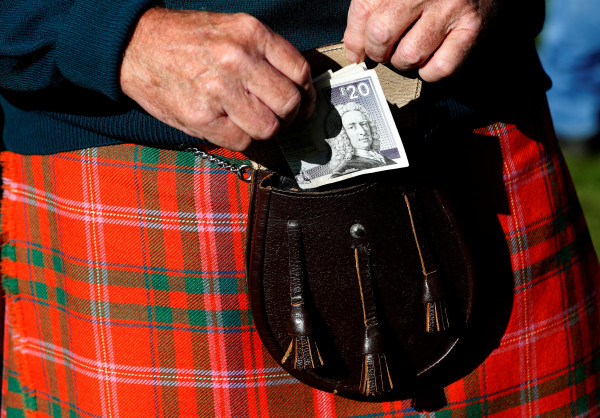

HM Revenue & Customs (HMRC) could save on pension tax under new rules affecting Scottish taxpayers, providers have claimed.
The tax office confirmed yesterday (21 February) it would continue treating tax rebates on 'relief at source' schemes in the same way as before following the introduction of the new income tax bands announced by the Scottish government last December.
On 'relief at source' schemes, those that apply tax relief after income tax has been paid, HMRC automatically pays out the basic rate of tax relief (20 per cent) and asks savers to claim back the remainder.
This means around one hundred thousand people falling into a newly created tax band could miss out on a small percentage of their contributions, Nucleus and AJ Bell reported.
From April this year a new 'starter rate' of 19 per cent will become effective as well as an and 'intermediate rate' of 21 per cent.
The higher tax rate will be raised to 41 per cent while the top rate of income tax will be 46 per cent, compared with 40 and 45 per cent respectively in the rest of the UK.
Those on the 19 per cent rate will benefit from an extra 1 per cent tax relief as HMRC said it would not recover the difference between the Scottish starter and Scottish basic rate.
Those on the 21 per cent rate however, will need to ask the tax office to rebate the additional 1 per cent.
Tom Selby, senior analyst at AJ Bell, said it was unlikely people affected by this issue would take the initiative to claim their tax back.
He said: "Many of these people will never have filled out a tax return before and may well question whether it is worth the hassle."
Rachel Vahey, product technical manager at Nucleus, agreed people are likely to miss out.
She said: “These people will just lose their additional tax relief because they won't ring up and claim it. I certainly don't think they will do a tax return."
The Scottish government believes about 874,000 people currently fall into the intermediate tax band, although, Ms Vahey pointed out, to be affected the person would have to be paying into a pension scheme, and that pension scheme would have to operate relief at source tax relief, so the numbers affected will be much lower.
Despite this, Mr Selby and Ms Vahey agreed any unclaimed tax could add up to a sizeable amount over the lifetime of a pot.
A person earning £30,000 and contributing 10 per cent of their salary would pay in £2,400 over the course of a year, receive tax relief at source of £600 and then reclaim an extra £30.
Mr Selby said while this might not sound like a lot, over the course of a lifetime that could add up to thousands of pounds.
The rules outlined by HMRC in a newsletter yesterday (21 February) only apply to the 2018 to 2019 tax year.
After that, HMRC will continue to "explore the most appropriate way" to cater for the new income tax rates and bands, it wrote.
Ms Vahey said: "It is good HMRC have reacted so quickly to the confirmation of the new Scottish income tax rates, and its speedy response will help advisers and providers whose clients are resident in Scotland understand the implications for relief at source.
"Continuing to add 20 per cent tax relief to everyone's pension contributions is definitely the simplest approach. However, it may have been a simpler approach for intermediate taxpayers if HMRC could instead make an automatic adjustment."
Scottish income tax – the new bands for 2018/19
Bands | Band name | Rates (%) |
Over £11,850-£13,850 | Starter Rate | 19 |
Over £13,850-£24,000 | Basic Rate | 20 |
Over £24,000-£43,430 | Intermediate Rate | 21 |
Over £43,430-£150,000 | Higher Rate | 41 |
Above £150,000 | Top Rate | 46
|
carmen.reichman@ft.com



